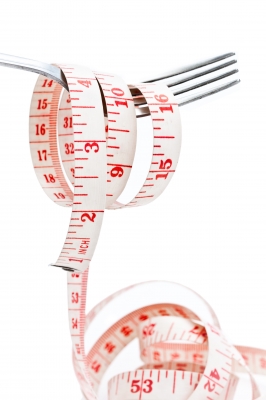Does meal timing really impact your weight?
 Could weight loss be about more than the foods you choose to eat? What if you could lose weight by simply changing your meal time?
Could weight loss be about more than the foods you choose to eat? What if you could lose weight by simply changing your meal time?
This is not a new idea. However, is it just a gimmick or actually supported by research. Well, I found three different studies regarding meal timing.
Study #1: Timing of food intake predicts weight loss effectiveness
This study was published in the International Journal of Obesity in 2013. The goal was to determine the relationship between meal timing and weight.
The study had 420 individuals divided into two groups – early eaters and late eaters. Early eaters were defined as eating lunch before 3pm. Late eaters defined as eating lunch after 3pm.
Both groups followed a 20-week weight loss treatment.
Study results show late eaters lost less weight and had a slower rate of weight loss compared to early eaters. The late eaters also skipped breakfast more frequently than early eaters.
The surprising piece is that energy intake, dietary composition, estimated energy expenditure, appetite hormones, and sleep were similar between the two groups.
Conclusion: Eating late may influence weight loss success.
Study #2: Role of sleep timing on caloric intake and body mass index (BMI)
This study was published in Obesity in 2011. The goal was to evaluate a relationship between both sleep timing and meal timimg in regards to weight.
Study participants included 52 volunteers completing seven days of food logs and wrist actigraphy. Wrist actigraphy is a device worn on the wrist recording movements used to estimate sleep. Participants were divided into two groups – late sleepers and normal sleepers. Normal sleepers were defined as sleep midpoint being before 5:30 a.m. Late sleepers were defined as sleep midpoint being after 5:30 a.m.
Late sleepers slept fewer hours each night. They went to sleep later, woke up later, and consumed more calories at dinner after 8pm. Their intake of fast food and soda was higher, with a lower intake of fruits and vegetables.
Researchers controlled for sleep timing and duration to evaluate the impact of eating after 8pm independently.
Conclusion: Calories consumed after 8pm may increase risk for obesity.
Study #3: High caloric intake at breakfast vs. dinner differentially influences weight loss of overweight and obese women
This study was published in Obesity in 2013. The goal was to compare a weight loss diet with a high calorie breakfast vs. a weight loss diet with a high calorie dinner.
The study contained overweight and obese women divided into two groups – high calorie breakfast vs. high calorie dinner – following a weight loss diet (~1400 kcal/day) for 12 weeks.
Calorie consumption for the two groups was broken down as:
High calorie breakfast: 700 kcal breakfast, 500 kcal lunch, 200 kcal dinner
High calorie dinner: 200 kcal breakfast, 500 kcal lunch, 700 kcal dinner
The group consuming a high calorie breakfast experienced greater weight loss and a reduction in triglyceride levels. Triglyceride levels actually increased in the high calorie dinner group.
Conclusion: A high-calorie breakfast with reduced calorie dinner may be a tool to manage obesity.
Summary
All three of these studies found meal timing does impact weight. Key take aways to promote a healthy weight:
- Eat breakfast
- Limit calorie intake after 8pm
- Consume majority of your calories for the day at breakfast and lunch.
Are you ready to make Heart Healthy Changes into Lifelong Habits? Use this assessment to get yourself on the right path — http://hearthealthmadeeasy.com.
All the best,
Lisa Nelson RD
Health Pro for HealthCentral
Image courtesy of winnond / FreeDigitalPhotos.net



